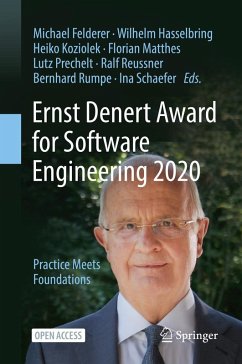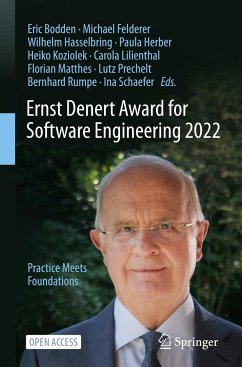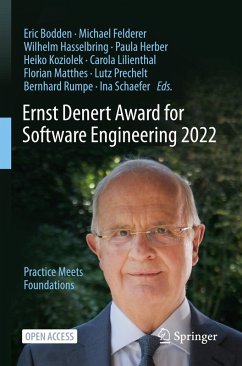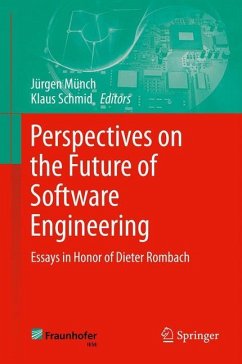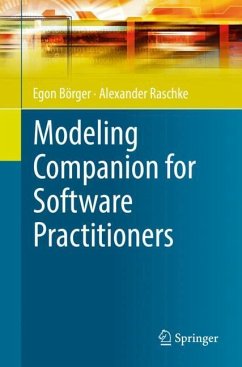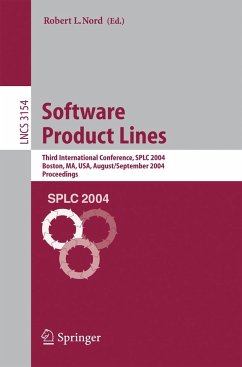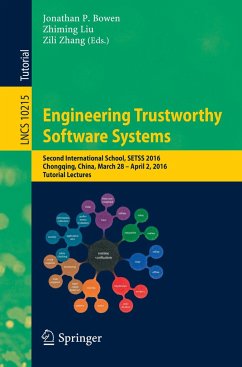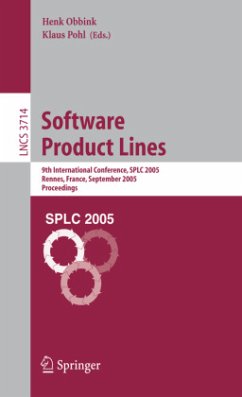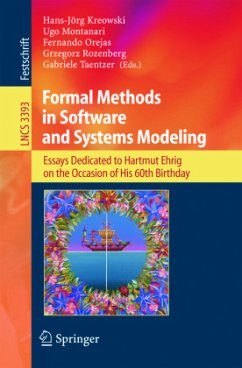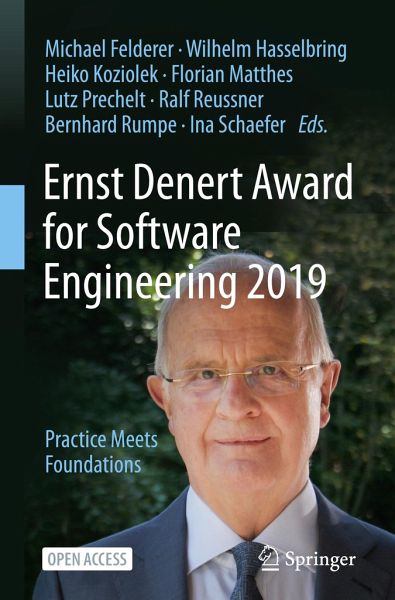
Ernst Denert Award for Software Engineering 2019
Practice Meets Foundations
Herausgegeben: Felderer, Michael; Hasselbring, Wilhelm; Koziolek, Heiko; Matthes, Florian; Prechelt, Lutz; Reussner, Ralf; Rumpe, Bernhard; Schaefer, Ina
Versandkostenfrei!
Versandfertig in 6-10 Tagen
38,99 €
inkl. MwSt.

PAYBACK Punkte
19 °P sammeln!
This open access book provides an overview of the dissertations of the five nominees for the Ernst Denert Award for Software Engineering in 2019. The prize, kindly sponsored by the Gerlind & Ernst Denert Stiftung, is awarded for excellent work within the discipline of Software Engineering, which includes methods, tools and procedures for better and efficient development of high quality software. An essential requirement for the nominated work is its applicability and usability in industrial practice.The book contains five papers describing the works by Sebastian Baltes (U Trier) on Software De...
This open access book provides an overview of the dissertations of the five nominees for the Ernst Denert Award for Software Engineering in 2019. The prize, kindly sponsored by the Gerlind & Ernst Denert Stiftung, is awarded for excellent work within the discipline of Software Engineering, which includes methods, tools and procedures for better and efficient development of high quality software. An essential requirement for the nominated work is its applicability and usability in industrial practice.
The book contains five papers describing the works by Sebastian Baltes (U Trier) on Software Developers'Work Habits and Expertise, Timo Greifenberg's thesis on Artefaktbasierte Analyse modellgetriebener Softwareentwicklungsprojekte, Marco Konersmann's (U Duisburg-Essen) work on Explicitly Integrated Architecture, Marija Selakovic's (TU Darmstadt) research about Actionable Program Analyses for Improving Software Performance, and Johannes Späth's (Paderborn U)thesis on Synchronized Pushdown Systems for Pointer and Data-Flow Analysis - which actually won the award.
The chapters describe key findings of the respective works, show their relevance and applicability to practice and industrial software engineering projects, and provide additional information and findings that have only been discovered afterwards, e.g. when applying the results in industry. This way, the book is not only interesting to other researchers, but also to industrial software professionals who would like to learn about the application of state-of-the-art methods in their daily work.
The book contains five papers describing the works by Sebastian Baltes (U Trier) on Software Developers'Work Habits and Expertise, Timo Greifenberg's thesis on Artefaktbasierte Analyse modellgetriebener Softwareentwicklungsprojekte, Marco Konersmann's (U Duisburg-Essen) work on Explicitly Integrated Architecture, Marija Selakovic's (TU Darmstadt) research about Actionable Program Analyses for Improving Software Performance, and Johannes Späth's (Paderborn U)thesis on Synchronized Pushdown Systems for Pointer and Data-Flow Analysis - which actually won the award.
The chapters describe key findings of the respective works, show their relevance and applicability to practice and industrial software engineering projects, and provide additional information and findings that have only been discovered afterwards, e.g. when applying the results in industry. This way, the book is not only interesting to other researchers, but also to industrial software professionals who would like to learn about the application of state-of-the-art methods in their daily work.





